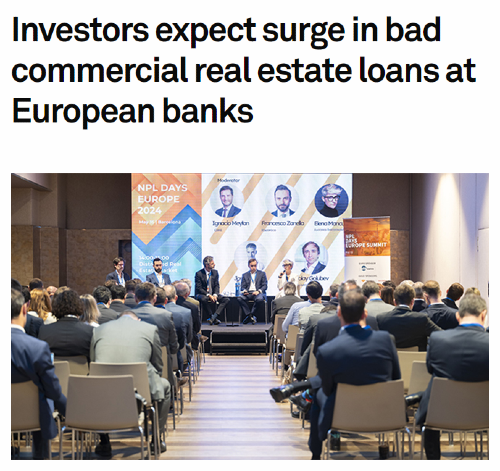

The European commercial real estate market faces a crisis with increasing bad loans and volatile conditions that could lead to significant global economic disruptions.
The commercial real estate (CRE) sector is poised for a significant upheaval, with indications that bad loans are set to increase markedly. This trend, initially emerging in Europe, is expected to have global repercussions. Financial institutions have been engaged in an "extend and pretend" strategy, providing additional funding to non-banks in hopes of weathering the storm until economic recovery takes hold. However, the bubble-like conditions and the opaque nature of the market are raising concerns about the stability and resilience of the financial system.
The European Central Bank (ECB) has highlighted the nascent status of CRE risk assessment and macroprudential policy frameworks. Problems stem from the market's intricacy and significant data gaps, exacerbated by the involvement of non-banks and international investors. The ECB's report acknowledges the complexity of bank exposure to CRE markets and the challenges in grasping the associated risks.


According to a Reuters report, CRE valuations are considered inflated, and market adjustments seem imminent. Standard & Poor's and Fitch Ratings have both issued reports predicting a downturn in CRE valuations, particularly in major urban office properties, and have noted potential widespread valuation deterioration across various segments, including U.S. retail, hotel, multifamily, and industrial properties.



The ECB's analysis shows banks are exposed to CRE markets through loans for CRE purposes and the use of CRE as collateral. This linkage implies that a market shock could increase credit risk and losses if borrower default coincides with a drop in collateral values. Economic theories suggest that using CRE as collateral might create a "financial accelerator effect," where CRE market prices impact borrowers' access to credit.


Data from the ECB and other sources reveal that German commercial property prices dropped by approximately 10% in 2023. This decline is emblematic of a broader trend across the euro area. The CRE sector accounts for a significant portion of Germany's output, highlighting the potential magnitude of the looming crisis.

The "extend and pretend" approach has been prevalent, with banks offering funding to non-banks to delay the realization and addressing of financial difficulties. However, this strategy may be reaching its limits as the global economy continues to show signs of weakness, putting additional pressure on rents, valuations, and the financial arrangements underpinning the CRE market.
Loans to euro area non-bank financial corporations have surged, suggesting that banks are shifting their lending away from non-financial corporations directly tied to CRE to these non-banks. This shift reflects an effort to manage risk and avoid asset liquidation, which could exacerbate the downturn.
The commercial real estate sector is approaching a critical juncture. Multiple reports and sources indicate an uptick in bad CRE loans, particularly in Europe, with global implications. The market's resilience is under scrutiny as the financial system braces for a potential revaluation of assets and the ensuing impact on the broader economy.